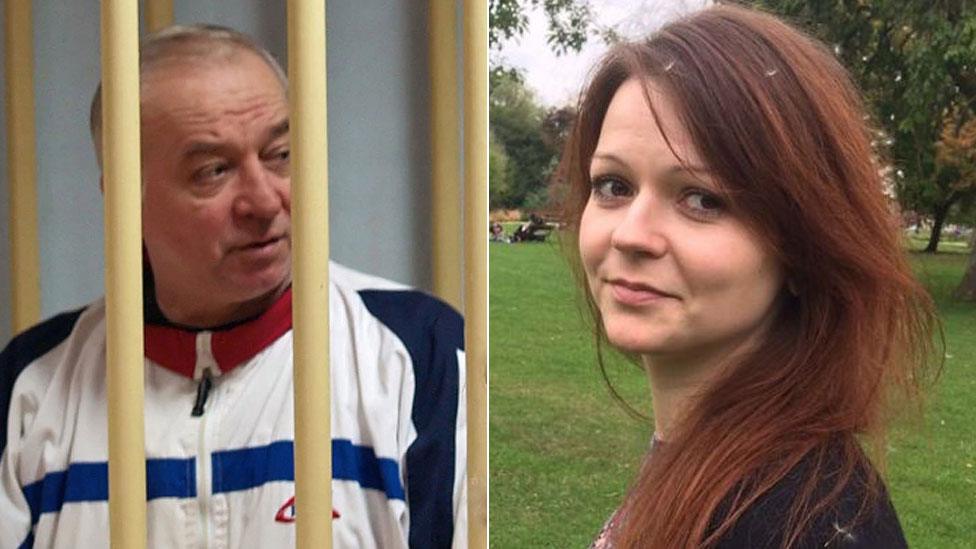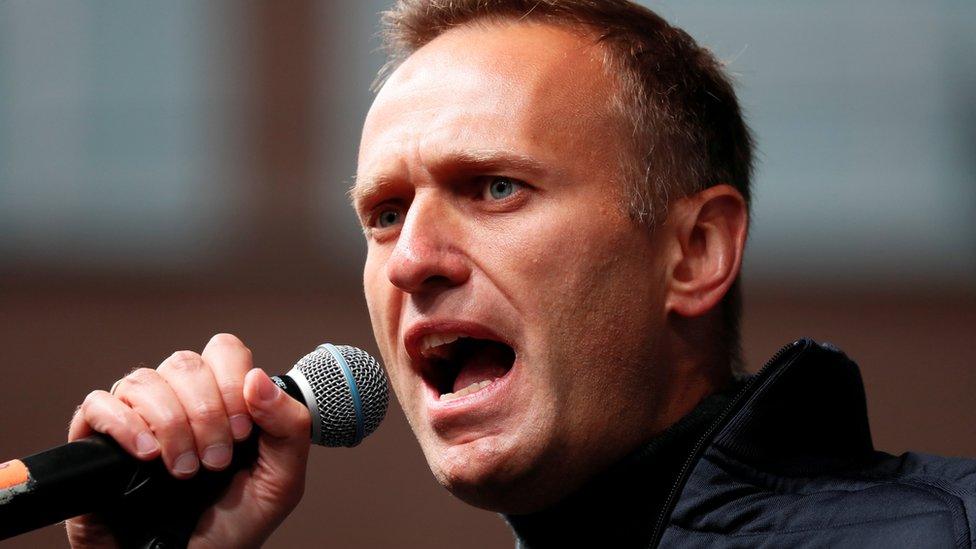UK defence secretary tells Russia 'go away and shut up'
- Published
Williamson: Russia 'should go away and shut up'
UK Defence Secretary Gavin Williamson urged Russia to "go away" and "shut up" as he unveiled plans for a new chemical weapons "defence centre".
He made the comments as he announced a £48m investment in a facility that will be located at the Defence Science and Technology Laboratory in Porton Down.
Scientists at the Wiltshire lab helped identify the nerve agent used to attack ex-Russian spy Sergei Skripal.
Russia said his comments demonstrated his "intellectual impotence".
In a speech on Thursday, Mr Williamson said the "shocking and reckless" attack on Mr Skripal and his daughter illustrated the increasing dangers the UK faced from chemical weapons.
Mr Williamson said there was "no doubt the attack came from Russia".
The UK is expelling 23 Russian diplomats and taking a range of other measures in response to what it said was the Russian state's culpability for the use of a military grade nerve agent on the duo in Salisbury.
Moscow has hit out at what it described as the UK's unacceptable provocations and threatened reprisals. It has denied involvement.
In questions after the speech Mr Williamson was asked what further measures the UK would take if Russia expelled British diplomats. He said: "We will look at how Russia responds to what we've done.
"It's absolutely atrocious and outrageous what Russia did in Salisbury - we've responded to that. Frankly, Russia should go away - it should shut up.
"But if they do respond to the action we have taken, we'll consider it carefully and we'll look at our options. But it would be wrong to prejudge their response."
A look around Porton Down, Britain's military research base in to chemical and biological attacks
Asked if the situation could lead to a new Cold War, Mr Williamson said that it had been described as a "cool war", adding: "Let's face it, relations aren't good, are they?"
Mr Williamson said the UK leads the world in research into chemical, biological and radiological warfare but said this expertise needed to be developed further to confront potential hostile activity by states and individuals.
"We know the chemical threat doesn't just come from Russia but from others," he said.
"I can announce we will be strengthening this capability by investing £48m in a new Chemical Weapons Defence Centre to ensure we maintain our cutting edge in chemical analysis and defence."
'Boorish statement'
But Russian Defence Ministry spokesman Igor Konashenkov criticised Mr Williamson's "boorish statement" as showing an "extreme level of intellectual impotence".
"All of this not only confirms the fact that London's accusations against Russia, which we have heard over the previous few years amount to nothing, but also the complete insignificance of the accusers themselves."
He added: "Russia long ago developed a strong immunity to London's fake accusations towards Russia."
Williamson: "Russia ripping up international rulebook"
On his visit to Porton Down, Mr Williamson also announced that, as a precaution, thousands of British troops would be offered vaccinations against anthrax, a spore-producing bacterial disease used in a series of bio-terror attacks in the US in 2001.
British troops who are held at high-readiness will be offered the vaccine on a voluntary basis so they are ready to deploy to areas where the risk of this type of attack exists.
Mr Williamson, who took over the role in November, is currently reviewing Britain's defences amid calls from Conservative MPs for a moratorium on cuts to the armed forces and defence capability.
The BBC's defence correspondent Jonathan Beale said Mr Williamson was making clear that Britain must invest more in defence to counter both conventional and emerging threats like cyber warfare.
"As Brexit beckons, the eyes of the world are on us. Rest assured our adversaries will be watching even more closely than our allies," Mr Williamson said.
"This is our moment to retain our competitive advantage."
The Defence Science and Technology Laboratory supplies specialist science and technology services to the armed forces as well as expert advice and analysis to government.
- Published14 March 2018

- Published2 September 2020
